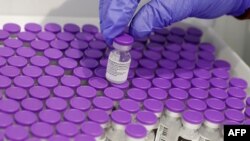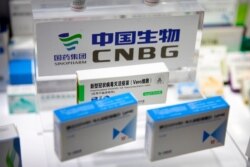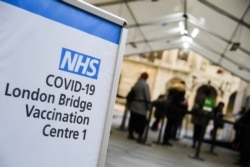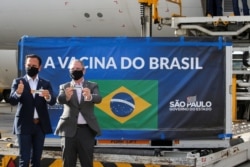The World Health Organization on Thursday approved the Pfizer-BioNTech coronavirus vaccine for emergency use, a move aimed at helping the developing world gain access to the vaccine sooner.
The WHO set up its emergency use process to help countries without their own regulatory resources to approve vaccines, clearing the way for their use.
"This is a very positive step towards ensuring global access to COVID-19 vaccines,” said Mariangela Simao, the WHO's access to medicines program leader.
However, the super-cold temperature the vaccine must be kept at — minus 70 degrees Celsius — makes shipping and storing it a challenge for developing countries.
COVAX, a global effort backed by the WHO to buy and distribute vaccines to poorer countries, has commitments for 2 billion doses of vaccine so far and is in talks with Pfizer-BioNTech to buy some of its vaccine, which is 95% effective after two doses.
Another COVID-19 vaccine, this one developed by a Chinese drugmaker, on Thursday became the first to be granted official approval by China’s government.
China’s National Medical Products Administration announced the conditional approval of a vaccine developed by Beijing Biological Products Institute, a subsidiary of state-owned Sinopharm. The regulatory agency granted the approval a day after Sinopharm said the vaccine had an efficacy rate of 79.3% against the coronavirus in a final large-scale clinical trial.
However, outside experts have questioned Sinopharm’s claims because it has not provided necessary data for it to be independently verified.
The newly approved vaccine is one of five developed by Chinese companies that have been administered under its emergency use program while still undergoing phase 3 trials. More than 4.5 million doses have been administered since July to essential workers and people considered high risk, including 3 million since mid-December.
The Sinopharm vaccine joins other potential coronavirus vaccines to receive approval from governments around the world.
Britain’s medical regulatory agency announced Wednesday that it has granted emergency authorization of a coronavirus vaccine developed jointly by British-Swedish pharmaceutical giant AstraZeneca and Oxford University.
Late-stage clinical trials of the AstraZeneca-Oxford vaccine revealed it to be 70% effective against COVID-19. The vaccine had a 62% efficacy rate for participants given a full two doses, but tests of a smaller sub-group revealed it to be 90% effective when given a half-dose followed by a full dose weeks later.
The new vaccines are coming as a more contagious strain of COVID-19 first detected several days ago in Britain has been identified at various points on the globe.
A Brazilian lab said Thursday it has found two cases of the British variant, prompting researchers at its Tropical Medicine Institute to urge a redoubling of quarantine measures. Brazil has reported more than 55,000 new cases and nearly 1,200 deaths in the past 24 hours, according to Johns Hopkins University. Brazil, with nearly 195,000 deaths, is second only to the U.S., and with more than 7.6 million cases ranks third in the world.
Officials in California on Wednesday announced the variant has surfaced in the southern city of San Diego. The Western state of Colorado was the first in the United States to report the new strain earlier this week.
A different variant of the coronavirus has been detected in South Africa.








